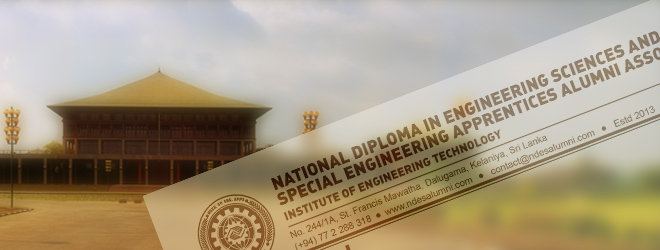Request to the Honorable Member of the parliament of Sri Lanka To amend the Engineering Council Bill 01-08-2016
We humbly request the Honorable Member of parliament of Sri Lanka to consider the following amendments to the Engineering Council Bill which was published (Gazette) on order by the ministry of Power and Renewable Energy on 1 st August 2016.
Page 2 PART -I Clause 3 b) of the Bill articulate the nominated council members by the prime minister it has to be amended to ensure the Neutral and Independent functioning of the Engineering Council without biasing to any professional Engineering Institute or any professional Engineering body.
Thirteen Council members appointed by the Prime Minister.
Chartered Engineers, Sri Lankan Chartered Engineers and almost equal number of UK Chartered Engineers who are Sri Lankan nationals. The above Chartered Engineers to be selected from the Engineering Organizations such as Electricity Board, Water Board, Railway Department, Sri Lanka Telecom PLC, Aviation Department , Ports Authority. etc ( Not nominated by any professional Engineering Institute such as IESL , IIESL or Any professional Engineering body in Sri Lanka such as Engineering Service which are to be regulated by the Engineering Council)
Page 7 and 8 PART – II Clause 12 and Clause 13 of the Bill articulate the power and function of the Engineering Council. Where we found the important powers and functions were to be bestowed to the Engineering Council are being handled by the two engineering Institutions ( IESL , IIESL ) in the past . These powers were created by their ( IESL , IIESL ) own Bye-Laws and executed in the past . These powers have to be change hand from the above Institutions ( IESL , IIESL ) to the Sri Lanka Engineering Council. Therefore the following powers and functions have to be Included to the Bill.
- Safeguarding the interest of the members.
- Promotion of reforms in the Engineering profession.
- Promotion of Engineering Education and review of courses of studies
- Regulation of professional Engineering bodies
- Grant Licenses to professional Institutions to assess candidates for inclusion on the national register. The Institution will act as an Awarding body.
- Recommend the academic and professional qualifications for appropriate membership of the
respective professional Institute. - Ensure the consistent standard among the professional Engineering Institutions.
Page 10 Part – III Clause 17 of the Bill articulate the Engineering professional practitioners categories that exceeds requirement have been included . It has to be amended in line with International Standard.
- A Chartered Engineer the abbreviated designation “CEng”
- An Incorporated Engineer the abbreviated designation “IEng”
- An Engineering Technician the abbreviated designation “EngTec”
Page 22 Part – VII Clause 41 and Clause 42 of the Bill articulate the Engineering practitioners and the required Qualifications for the Engineering Practitioners.
Engineering Practitioners have to be reduced to three categories to maintain the International
standard
- Chartered Engineer
- Incorporated Engineer
- Engineering Technician.
Schedule A has to be amended to maintain the International standard and specifically to define the Independency and neutrality of the Engineering Council from the professional Engineering Institutes, Academicals Engineering Institutes or from any other Engineering body. Power and functions of the Engineering Council have to be in line with International practice without biasing to any professional Engineering Institute. The Engineering Council has to pave the way to develop more professional engineering Institutes in Sri Lanka in future. The Engineering Council may not give the monopoly to any particular existing professional Engineering Institute by naming the Institute in the Bill. The Engineering Council has to be a common regulating body to all professional Engineering Institutes and all Academic Engineering Institutes which are to be established in future in Sri Lanka. It has to be neutral to the existing professional Engineering Institutes and the existing academic Engineering Institutes.
Qualification of the Engineering Practitioners have to be amended as follows.
Chartered Engineer: Academic Qualifications recognized by the Engineering Council. Candidate from any professional Engineering Institute which is accredited by the Engineering Council. (Without mentioning the name of a specific professional Engineering Institute in the Bill to avoid the bias). This bill has to be a common Bill for all professional Engineering Institutes without promoting a particular Institute.
* By naming the IESL Institute to award the Chartered Engineer, this Act itself justifying the closer of the professional development route (which promote more than 95% of the Sri Lanka’s engineering profession population ) and violates the fundamental rights of the above engineering profession population. Where the IESL has ceased the professional development route (mature candidate route) in 2010 by its own Bye- laws (Class of members 4.i.g) . The closer of the “mature candidate route” is the violation of International Engineering Councils regulation and practices. This route was popularly known in the past as “mature candidate route” at present it is known as “technical report route“. This “technical report route” is the professional promoting route to the engineering practitioners from the lower level Engineering practitioners to the highest level Engineering practitioner that is “technician Engineer” to the “Chartered Engineer” status which is the highest professional engineering practitioner’s status. This Engineering professional development route is in practice in all other countries except Sri Lanka.
Incorporated Engineers: Academic Qualification recognized by the Engineering Council. Candidate from any professional Engineering Institute which is accredited by the Engineering Council. (Without mentioning the name of a specific professional Engineering Institute in the Bill to avoid the bias). This bill has to be a common Bill for all professional Engineering Institutes without promoting a particular Institute.
Engineering Technician : Academic Qualification recognized by the Engineering Council. Candidate from any professional Engineering Institute which is accredited by the Engineering Council. (Without mentioning the name of a specific professional Engineering Institute in the Bill to avoid the bias). This bill has to be a common Bill for all professional Engineering Institutes without promoting a particular Institute.
Sri Lanka Engineering Professionals


